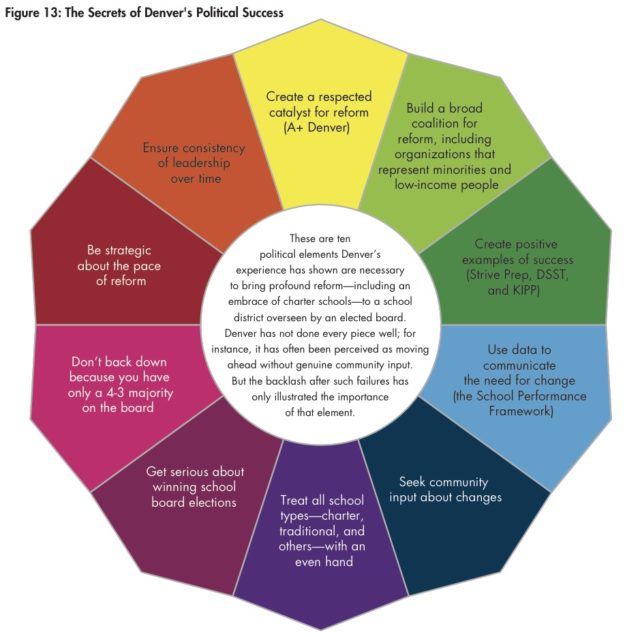Dear Members and Friends,
Just a few weeks ago we let you know that A+ is now officially A+ Colorado. As we have done in Denver (and will continue to do), we can’t wait to partner, collaborate, and engage with families, educators, and community leaders in districts across the state to celebrate great work happening in classrooms, and to build an education system that works for all Colorado kids. Look forward to A+ Colorado conducting research, blogging and reflecting on a growing number of school districts around the state.
A+ Updates
How is Denver Public Schools Doing?
Last month, A+ released its annual check-up on the state of Denver Public Schools. The report, Big Gains, Big Gaps, Big Ideas assesses progress made towards the achievement targets set by the Denver School Board and administration in the Denver Plan 2020. (To see our data analysis that compiles how all Colorado schools and districts with publicly available data performed relative to the rest of the state, click here). The report finds that the district has made significant advancements–dramatically increasing its percentile rankings, performing comparable to or better than similar districts, and bringing the college remediation rate below 50%. But at the same time, Denver’s ACT scores remain stagnant, and achievement gaps remain. Progress has certainly been made, but it is neither fast nor broad enough for the district to reach its goals.
A Decade of Reform in Mapleton Public Schools
Just over a decade into their “Choices for Learning” reform effort, the Mapleton school district has radically restructured its process of school selection and community relationships. But where do they stand on their other goals–including dramatic improvement in student performance? Our report, Radical Change, Modest Gains, looks at slow gains taking hold in the Mapleton school district, and highlights where the district should redouble its efforts. At the start, Mapleton received a $2.6 million Bill and Melinda Gates Foundation grant and national attention. Academically, Mapleton has had modest gains; but much work lies ahead for this small, inner-ring suburban school district.
A+ Going National: A+ Colorado Teamed up with the Progressive Policy Institute
A+ partnered with the Progressive Policy Institute (PPI) to host Reinventing America’s Schools: Lessons from the Denver Experience on May 4. District leaders, school administrators, and organization members from Denver, Kansas City, Atlanta, Indianapolis, Oakland, and San Antonio attended panels and breakout sessions to discuss how Denver Public Schools’ use of the portfolio strategy has been effective, and how an elected school board has worked in favor of reform. Attendees heard from director of the Reinventing America’s Schools Project at PPI David Osborne, former and current members of A+, and other participants in Denver’s efforts to adopt what Osborne calls a “21st Century model for education,” where one size is not expected to fit all students.
So what lessons can be learned from the Denver experience? Discussions centered around the benefits of granting schools more autonomy along with more accountability. PPI distilled the lessons from Denver into ten critical conditions for change that others might consider when embarking on similar change efforts. Attention to these ten elements created and maintains a political environment in Denver that made public education improvement a sustainable effort.

In Other News
Restructuring Schools in APS
Fletcher Community School is one of the lowest performing schools in the state of Colorado despite multiple district interventions including seven years of pilot status. A quick glance at Fletcher’s performance on PARCC last year exemplifies the student achievement crisis at Fletcher: fewer than 15 of the roughly 130 students tested in 2015 met grade-level expectations on both the English Language Arts and Math exam. In response, at last Tuesday’s Aurora Board of Education Meeting, the Board discussed making bigger, structural changes to the school by converting it to a charter-managed school.
Currently, Superintendent Munn recommends that Rocky Mountain Prep, a Colorado charter network, start to replace Fletcher one year at a time. Rocky Mountain Prep has two Denver campuses, both of which serve primarily low-income students of color, much like Fletcher Community School. On 2015 PARCC, 42% of Rocky Mountain Prep students met or exceeded expectations in English Language Arts and 48% met the benchmark in Math. Superintendent Munn and the Board will now undertake a rigorous review process to determine whether or not Fletcher will indeed be replaced by Rocky Mountain Prep starting in the 2017-18 school year.
New Tool for Comparing School Districts
Since we were recently critical of Education Cities educational equity metric released last month (which has some value for in-state but not cross-state comparisons), we thought we would point to another new data set that does a great job of allowing you to compare school districts throughout the country.
This new data set organized by Sean Reardon and his team at Stanford allows you to make apples to apples comparisons while providing some great visualizations. You can explore here or go to the source here. There are some interesting stories in the Colorado data that we intend to dig into further.
District Highlights
There have been so many important developments, we’ve put together a list of the top stories:
- Aurora Public Schools chose the current interim principal, Gerardo De La Garza, to take the permanent position after a national search to turnaround the state’s most troubled high school, Aurora Central.
- Congratulations to the DPS board for choosing a new school board member for NE Denver after a series of debacles in the vetting process. Rachele Espiritu will be assuming the vacant seat.
- Denver School Board made a landmark decision to create a new school management organization within the district. A separate nonprofit called the Luminary Learning Network will oversee four of the district’s innovation schools. It does make you wonder why schools claim the need to be free from district mandates when they have had innovation status for a number of years which supposedly promises just that.
- The DPS board adopted the School Performance Compact, which will help clarify how the district intervenes with the lowest performing schools, beginning in September of this year.
School Spotlight
William Smith High School
 As conversations about autonomy and flexibility heat up in districts across the metro area, A+ saw one clear example of how these at-times abstract concepts manifest themselves in schools. William Smith is an Aurora Public Schools pilot school meaning that the school has increased autonomy and flexibility in scheduling, program, curriculum, and staffing.
As conversations about autonomy and flexibility heat up in districts across the metro area, A+ saw one clear example of how these at-times abstract concepts manifest themselves in schools. William Smith is an Aurora Public Schools pilot school meaning that the school has increased autonomy and flexibility in scheduling, program, curriculum, and staffing.
Since 2008, William Smith has used its autonomy to continuously refine an Expeditionary Learning School model that allows students to engage in cross-curricular learning, educational school trips (expeditions), and high-interest areas of study. A+ had the opportunity to participate in William Smith High School’s annual instructional review–a full day of classroom visits and panels composed of staff and students.
One great strength of William Smith is the way the school takes full advantage of flexible scheduling to support cross-curricular learning. When we visited, the sophomore class was in the midst of a project about disease and contagion that incorporated Language Arts, Art, History, Science, Math and Theater. The project was co-planned and taught by teachers across subjects. Teachers explained to us that as a grade level they have the freedom to determine schedules based on project needs, e.g. if Art and History need to be combined into a double block rather than two individual blocks for a project, then the schedules shift to allow it. Teachers collaborate with each other to design the projects and schedules while students collaborate to build boats, put on plays, or install complex art shows.
The result is clear: when we visited, the entrance had been overtaken by an enormous, artistic amalgam of machines that lit up, spun, and made music as you walked over rug- covered circuitry on the floor–a project that literally synthesized the creative, cross- curricular opportunities William Smith provides its students.
We Want to Hear from You!
Educators across the metro area are doing great things, and we want to hear about it! At A+ we’re always on the look out for excellent programs in all schools. We’re particularly interested in:
- Opt-in/out decisions for district services
- Physical education and arts education
- English language instruction
- Teacher leadership and distributed leadership
- Teacher evaluation and compensation
- Turnaround strategies
- Community engagement
To share your approach with us, email Hayley at hayley@aplusdenver.org.
Cheers,
A+ Colorado